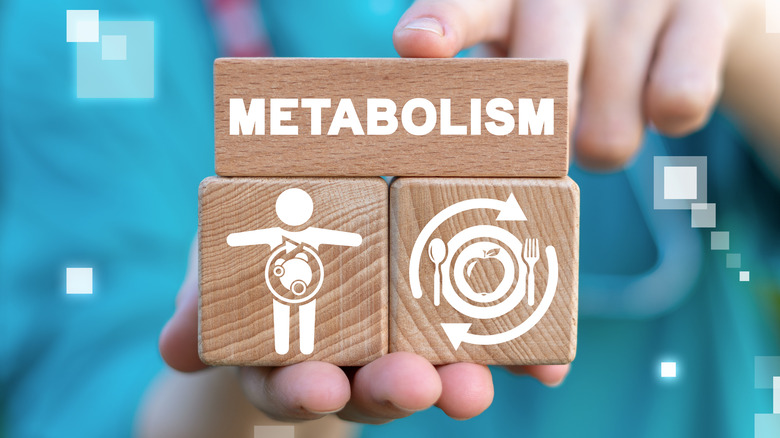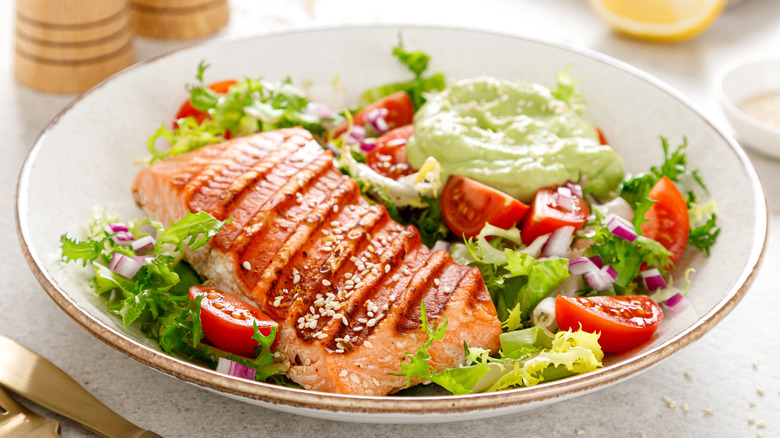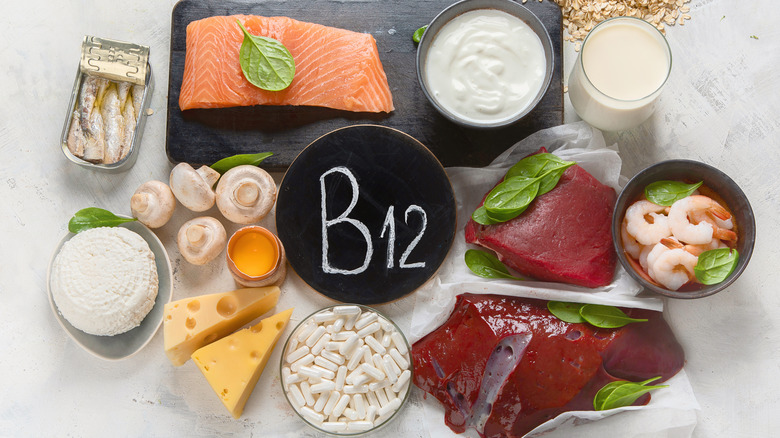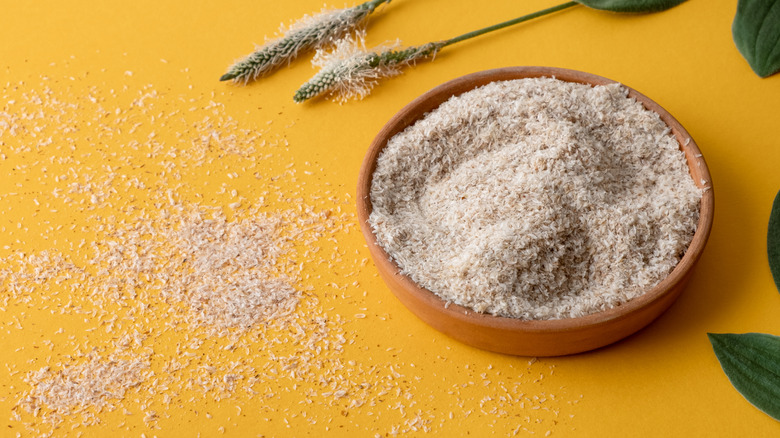14 Habits That Can Boost Your Metabolism
How's your metabolism, folks? Have you checked in with it lately? Sat it down, had a chat, and talked about its goals for the future? Okay, so obviously the metabolism doesn't have a mind of its own, but frankly, it can feel like that sometimes. The process by which our bodies change what we consume in our diets into energy, our metabolic process is responsible for pretty much everything our body does to stay alive, from breathing to keeping our body temperature safe and regulated (per the Cleveland Clinic).
When people refer to the speed of their metabolism, though, it's most likely that they're discussing how quickly they work through the calories they eat, and therefore how capable they are of maintaining, losing, or boosting their body weight. And there are a huge amount of things that can make our metabolisms slower, meaning that we conserve our energy from food more efficiently – or, conversely, make our metabolisms quicker, which then means that our calories are used up faster.
So if you're in the market to give your metabolism a little pep-talk and quicken it up, how do you do it? Luckily, it can sometimes be as simple as incorporating a few new habits into your lifestyle.
Drinking a cup of coffee in the morning can kickstart your metabolism
Your morning coffee is the perfect way to drag yourself out of semi-sleep and get you into your day properly. But did you know that that cup of Joe doesn't just wake up your brain, but your metabolism too? This is all down to the caffeine in your coffee, the stimulant that makes you feel more alert and alive — and it could have a positive impact on your metabolism, too (per Healthline).
A study published in the American Journal of Clinical Nutrition showed that when people increased caffeine intake in the long-term, by drinking coffee or tea, they generally had better results with long-term weight loss.
Bear in mind, however, that while caffeine does seem to affect metabolism, for any significant changes, you'd have to drink a lot of coffee. Further research, again published in the American Journal of Clinical Nutrition, found that to boost metabolism by 13%, people had to drink what would equate to around seven cups of coffee per day. That amount of caffeine may naturally have some negative consequences on other aspects of your health, including a reduced ability to sleep, higher levels of anxiety, and potentially an increased amount of calories consumed, if you're drinking your coffee with sugar.
Having spicy meals might make your metabolism faster
If you're not a fan of spicy foods but want to find a way to boost your metabolism, you might have cause to rethink your stance the next time you're in the chili section at the supermarket.
Eating hotter foods may provide a boost to your metabolism, speeding up the process by which you work through calories, according to the Cleveland Clinic. It's the capsaicin present in spicy foods, which gives it its burning sensation, that stimulates your metabolic process. "It seems to rev up the body's fat-burning mechanisms. That can help with weight loss and weight management," says registered dietitian Patricia Bridget Lane (via the Cleveland Clinic).
And in addition to making your metabolism faster, eating spicy foods that contain capsaicin might assist you in managing weight in different ways. Capsaicin can act as an appetite suppressant, with the spicy compounds interacting with your hypothalamus to make you feel more full. "People who eat a diet rich in spicy foods tend to eat less food overall throughout the day," states Lane.
Make your breakfast bigger in the morning
Making your meals larger to burn calories quicker feels like the ultimate contradiction, right? Surely, if you eat more, you're just going to have more to work through? Logically, yes, that may be the case. But amazingly, by making one meal bigger — specifically, your breakfast — you may usher in powerful effects on your metabolism.
This is according to a study published in The Journal of Clinical Endocrinology & Metabolism, which looked at the effects of diet-induced thermogenesis and how quickly people burned energy after particular meals in the day. The participants were split, with some eating a high-calorie breakfast and a low-calorie dinner, with the others doing the opposite. Incredibly, it was found that for the group eating a high-calorie breakfast, their diet-induced thermogenesis was over twice the speed of those eating a larger dinner. Additionally, the folks eating a bigger breakfast had fewer cravings for high-energy foods like sweets throughout the day, and also had a lower spike in blood sugar and insulin. This boost in calorie-burning caused by eating a big breakfast may have powerful implications for people who are trying to keep their metabolism high.
Go for a walk on your lunch break
Over the course of our day, so many of the little decisions we make can add up to much larger consequences later down the line. And the incorporation of one little habit — a simple walk during your lunch break — will not only help you stretch your legs and get some fresh air in the middle of your work day, but may also cause your metabolism to increase.
"For most people, walking for extended periods of time each day can have an overall positive effect by providing a boost in your metabolic processes," advises sports medicine specialist Natasha Trentacosta (via Pop Sugar). And the more you walk, the better, with strolling at a quicker speed serving to increase your metabolic rate more rigorously than if you're taking a more leisurely pace.
Bear in mind, however, that consistency is key. While your metabolism will speed up with walking, unless you make regular exercise a habit that you stick to regularly, it could be a short-lived boost. Trentacosta recommends not just walking for exercise, but also practicing resistance and HIIT training to hit your metabolism from all angles and provide a sustained, long-term boost.
Incorporate some resistance training into your workout
It's well-known that exercising regularly is an excellent way to keep your fitness up and boost your metabolism (per WebMD). But it's especially important to consider how you exercise, as well as the most effective workouts to amp up your metabolism even further. And if you really want to supercharge your metabolic process, incorporating resistance training into your workout is a habit that you shouldn't ignore, says WebMD.
Resistance training is one of the most efficient ways to build muscle across your entire body. The more muscle you have, the quicker your metabolism is, with each pound of muscle burning three times the amount of calories than a pound of fat does. What's more, the more committedly you work out and tire out your muscles, the more your body has to work to recover, creating what's known as the "afterburn effect," where your metabolism amps up in the hours following a workout, resulting in even more calories burned (per Healthline). Practicing your resistance training in circuits may heighten this effect even further, due to your body having to work harder to recover.
Make sure you're staying hydrated
Who would have thought that a simple glass of water could boost your metabolism? Well, folks, it's true, as long as you're drinking enough glasses of water each day to keep your body well-hydrated.
"Water's involved in every type of cellular process in your body, and when you're dehydrated, they all run less efficiently — and that includes your metabolism," states Baptist Sports Medicine managing director and personal trainer, Trent Nessler, to WebMD. If you're not drinking sufficient amounts of water, the chemical reactions that comprise your metabolism are unable to be completed to their full potential, and therefore, the whole thing slows right down.
That's why it's important to keep up on your water every day, with roughly 6-8 glasses being an optimal amount (per the NHS), although this will vary from person to person. Staying hydrated isn't just important for your metabolism, either. Drinking rough water daily also keeps our digestive system running smoothly, preventing constipation so that our food and drink can be filtered through effectively and our kidneys can remain fighting fit.
Get enough sleep for a faster metabolism
If you're in the fashion of cutting your sleep short by an hour or two every night to finish that new series on Prime, we'd recommend trying to shift your viewing times back a little, folks. One of the best habits we can develop to boost our metabolisms is getting enough sleep every night.
When we don't get enough sleep, a series of chemical changes occur in our bodies, all of which hamper our metabolisms and cause our calories and fat to be burned at a slower rate (per WebMD). One of the first responses to sleep deprivation is an increase in cortisol, which slows down our bodies' energetic processes, meaning we preserve fat for fuel instead of burning through it. Our bodies also become less able to manage our insulin levels, meaning that instead of our fats being cycled through properly, they're again stored and conserved for energy.
Being more tired because of a lack of sleep can also wreak havoc on our diets and cravings, and we tend to opt for higher-carb and higher-calorie snacks when we're feeling groggy. The solution? Establish a proper sleep routine, and make sure you're getting ample amounts of rest each night.
Instead of your regular exercise, try doing some HIIT workouts
How often have you heard that HIIT workouts are one of the best things you can do for your fitness? Gets a bit tiresome, right? Well, unfortunately, people, we're not going to break that habit here. The rumors are true: HIIT workouts are super effective, not least because they provide you with an efficient workout that burns calories fast. Plus, they can also seriously fire up your metabolism after the fact (per Healthline).
A study conducted in Sports Medicine examined the effects of performing HIIT workouts on resetting energy expenditure after exercise and found that the exercise style raised metabolic burn significantly following a workout. Findings revealed that HIIT workouts provided the most drastic boost in metabolism after exercise, in comparison to resistance and aerobic training. It's also worth bearing in mind that HIIT workouts can improve your performance in other training styles, may help you control your blood sugar, and most appealingly for us, give you a serious workout in a shorter space of time (so you can spend more time, you know, not working out). That's a win in our book, kids!
Having smaller meals throughout the day can make your metabolism quicker
Are you getting a little tired of having the same three boring meals every day? Are you a premium snacker, preferring to freestyle your food, a little here, a little there, instead of having to trawl your way through hours of cooking? Well, we've got good news for you, folks: Eating smaller meals over the day can have a boosting effect on your metabolism (per Duke Health). When we eat large meals infrequently, the body can become overloaded by food, creating what metabolic disease researcher Deborah Muoio refers to as a traffic jam. The more we eat, the more this "exacerbates the traffic problem and can push cells into a state of metabolic gridlock," Muoio says, which therefore slows down our metabolisms.
However, when we eat less, more often, our metabolism becomes less clogged up, and the food moves through our bodies at a natural, regular pace. Exercising regularly can also keep things moving apace, says Muoio, giving our bodies more capacity to process the next round of food.
Make sure you're eating enough calories
If you're looking for ways to boost your metabolism and potentially lose weight, it might be tempting to try and limit your calorie intake. But in fact, that's one of the worst things you can do, and a far better habit is to ensure that your calorie intake every day is adequate. When we restrict our calories, our body can respond by lowering our metabolic rate, to try and conserve the energy that's already there (per Healthline). This, therefore, leads to fewer calories burned overall, as research published in the International Journal of Obesity discusses.
What's more, this effect doesn't just stop when you start eating a healthy amount of calories again. A study published in the Obesity journal examined the long-term effects of calorie-restricted diets and found that the lowering of the metabolism that occurs when you're keeping calories low continues long after the diet stops. When you don't eat enough calories, you also tend to lose muscle, which means that your overall metabolic rate is lower, as muscle burns more calories per hour than other things that make up the body, like fat.
A cup of green tea a day could help your metabolism get faster
There's a reason why people around the world love green tea. Aside from its refreshing taste, it's also been linked to a seemingly endless list of health benefits, from lowering skin inflammation to assisting in bolstering heart health (per Medical News Today).
And a habit of a cup or two of green tea a day may also provide your metabolism with some powerful benefits. A review published in Advances in Nutrition examined the effects of green tea extract on the body's ability to metabolize fat and found that while results were slightly inconsistent from study to study, in some cases, there did seem to be a marked increase in fat oxidization following green tea consumption.
A different review published in the Cochrane Library, indicated that drinking green tea regularly did have an impact on weight loss — but that overall, this impact appeared to be fairly insignificant. Despite this, having a few cups of green tea every day seems to do the body a world of good, so we'd recommend turning that kettle on.
Practicing some mindfulness meditation every day may help your metabolism
Making sure our minds are healthy is as important as keeping our bodies in good working order. But when you're feeling overwhelmed, tired, or stressed, this can manifest itself not only in your mood, but in your metabolic rate, too.
Stress can have quite an impact on the metabolism due to the resultant effect it has on your cortisol levels, which may then alter the rate by which our bodies process food, says Medical News Today. Being stressed could also alter our eating habits.
That's why finding ways to manage stress is crucial — and why practicing a form of meditation, like mindfulness, can help enormously. By committing to daily mindfulness meditation, you may be able to reduce stress levels significantly, re-centering yourself and creating a space in which you can recognize and process sources of stress (per Headspace). The best part is that meditation only takes a few minutes every day, and it's never been easier to start, with a range of apps and YouTube videos available online to guide you through your daily sessions.
Ensure that you're getting enough B vitamins
Have you been taking your multivitamin recently? No? Well, it's high time that you cracked open that bottle again, people, especially if that little capsule contains B vitamins.
Keeping on top of your vitamin B intake is one of the most bolstering habits you can develop for your metabolism, as a study published in Current Medical Science shows. Researchers found that supplementing the diet with B vitamins resulted in a boost to the metabolism in rats, which could have some seriously beneficial implications for humans, too.
And if you don't have a bottle of vitamins close to hand, never fear — there are plenty of food sources where you can top up your vitamin B levels effectively. Fish and meat sources, like salmon, beef, and organ meats, are all abundant in the vitamins, according to Healthline. If you're following a plant-based diet, though, never fear, as you can also get a good amount of B vitamins from sources like leafy greens, various beans and pulses, and nutritional yeast.
Eat a little extra fiber every day
One of the best ways you can keep your metabolism healthy is not by taking things away from your diet, but by adding things in. And getting a little extra fiber is a great place to start.
Not only is getting more fiber good for you generally, with cholesterol and blood sugar levels and digestive health all aided by the nutrient (per the Mayo Clinic), but it's also your metabolism's best friend. A review published in Nutrients seemed to indicate that eating adequate amounts of fiber had positive implications for your metabolism, although the researchers did conclude that more research was necessary to determine exactly how fiber and the metabolism interact.
If you're trying to boost your metabolism to burn more calories and manage weight, eating fiber could be useful for the latter, too. Eating foods high in fiber will result in you feeling more full, thanks to the bulking effect of the nutrient in your digestive system, which will therefore lead to you wanting to eat less overall (via the Mayo Clinic). This appetite-controlling effect might be useful if you're prone to snacking between meals. Try loading up your diet with fruits, vegetables, and whole-grain products, all of which are high-fiber food items that can keep you getting the necessary amount every day.















